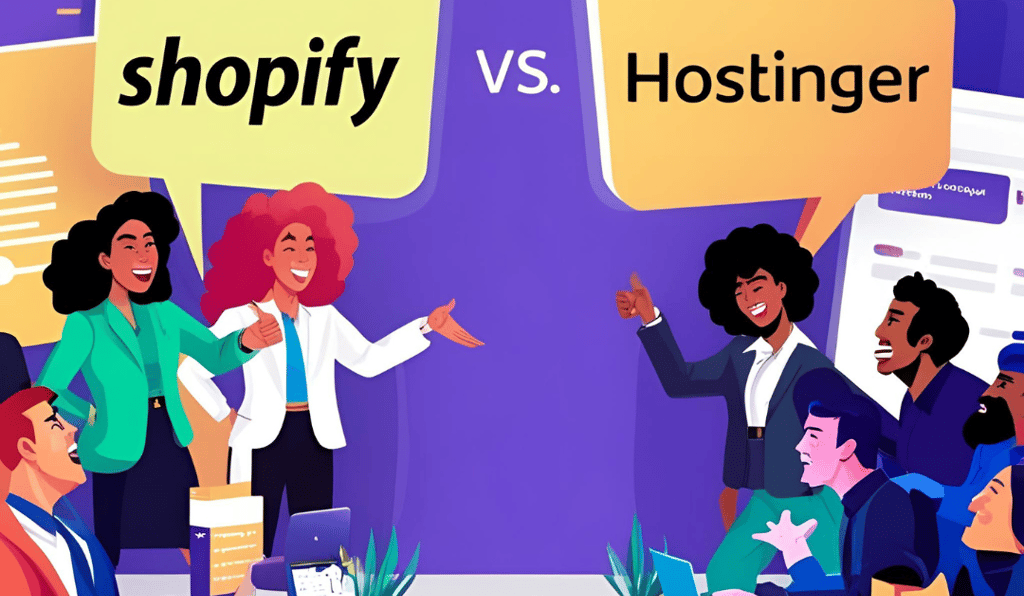Launch Your Website in Just 5 Days
Comparing Shopify and Hostinger: Which is Right for You?
Whether you are setting up an online store or hosting a personal blog, understanding the strengths and weaknesses of each can help you make an informed decision.
DIGITAL MARKETING
os
4/15/20252 min read


Overview of Shopify and Hostinger
In the realm of e-commerce and website hosting, Shopify and Hostinger stand out as two prominent platforms. Each caters to distinct needs, providing users with tailored solutions for their specific requirements. Shopify is predominantly an e-commerce platform engineered for online retail, while Hostinger serves as a versatile web hosting provider, offering a range of hosting plans suitable for various website types. This article will delve into the advantages and disadvantages of both Shopify and Hostinger, helping you make an informed choice.
Shopify: Advantages and Disadvantages
Shopify's primary strength lies in its dedicated focus on e-commerce. The platform integrates a plethora of tools designed to make setting up an online store both quick and efficient. Among its advantages are:
User-Friendly Interface: Shopify's interface is intuitive, ensuring that even those without technical expertise can navigate and create a store with ease.
Robust E-commerce Features: From inventory management to payment gateways, Shopify provides a comprehensive suite of e-commerce functionalities.
Extensive App Ecosystem: The platform boasts a wide array of apps that allow businesses to enhance their store's capabilities, enabling customization that can cater to unique business needs.
However, Shopify is not without its disadvantages. Some notable concerns include:
Monthly Subscription Fees: The cost of running a Shopify store can accumulate significantly due to monthly plans and transaction fees for third-party payment gateways.
Limited Customization: While customizable to a degree, advanced users may find Shopify's customization options restrictive compared to self-hosted platforms.
Hostinger: Advantages and Disadvantages
On the other hand, Hostinger emerges as a robust web hosting provider. Known for its affordability and diverse plans, it appeals to a variety of users, from bloggers to small e-commerce businesses. Key advantages of using Hostinger include:
Cost-Effective Plans: With competitive pricing, Hostinger allows users to start a website without a hefty investment.
Versatile Hosting Options: From shared to VPS hosting, Hostinger offers a range of plans tailored to different needs and budgets.
High Performance: The platform boasts impressive loading speeds and uptime, crucial for any website's success.
Despite its many merits, Hostinger also faces criticisms, including:
Complexity for Beginners: For those new to website management, Hostinger's control panel may be overwhelming compared to more straightforward solutions like Shopify.
No Built-In E-commerce Features: Unlike Shopify, Hostinger requires additional tools for e-commerce functionality, which could complicate the setup for online stores.
Final Thoughts
Ultimately, the choice between Shopify and Hostinger should be guided by your specific needs and goals. If your primary focus is running a comprehensive e-commerce operation, Shopify's specialized features could prove indispensable. Conversely, if you seek affordability and flexibility in hosting your website, Hostinger may be the better option. By weighing the advantages and disadvantages of both platforms, you can tailor your decision to fit your unique requirements.
If you've chosen to go with Hostinger, you can use this link https://hostinger.com?REFERRALCODE=LSAOUMA21F8A to receive a 20% discount on your purchase.



Subscribe to our newsletter
Address
505-6300 avenue Auteuil,Brossard, Qc J4Z 3P2
